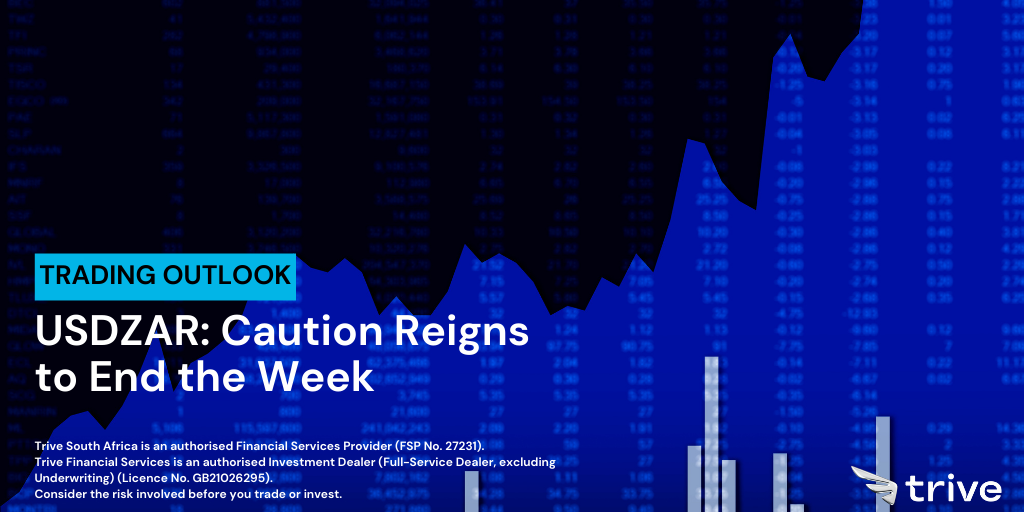
The USDZAR pair presents a curious case after appreciating over 0.33% during the session but is on course for a week of losses after declining over 0.2% this week. Despite the broader dollar’s recent gains, the South African rand (ZAR) is finding support on Friday morning. This counterintuitive move stems from two key factors: dovish signals from the US Federal Reserve and positive anticipation surrounding South Africa’s upcoming PMI data.
Firstly, comments from New York Fed President John Williams suggesting potential rate cuts later in 2024 have weakened the dollar. This dovish stance stands in contrast to the South African Reserve Bank (SARB), which has maintained a hawkish tone, suggesting the potential for further interest rate hikes in South Africa. This divergence in monetary policy expectations could be contributing to the ZAR’s relative strength.
Secondly, the recently released Absa PMI survey is also fostering cautious optimism. A reading of 51.7 for February, up from the 43.6 registered in January, signals improving economic health in South Africa, potentially attracting investors and buoying the ZAR. However, ongoing concerns surrounding public entities and the upcoming election continue to cast a shadow over the South African economy, limiting the ZAR’s upside potential.
Technical
The 4-hour chart presents a critical juncture for the USDZAR as it attempts to cement a position above a significant supply zone and the 20-SMA, currently trading at R19.23033. The currency pair’s recent manoeuvres above the 20-SMA (green line) amidst a downward-sloping trend of the same average hint at a potential reversal of fortunes. The juxtaposition of the upward-sloping 50-SMA (blue line) and 100-SMA (orange line) below the 20-SMA adds to this narrative, suggesting a battleground for short-term direction. The RSI, now above the neutral 50 mark at 53.78, indicates emerging bullish momentum.
Should the pair maintain its stance above the critical 23.60% Fibonacci retracement level, the immediate resistance at R19.27473 beckons. A decisive push beyond this, particularly on significant trading volume, could pave the way to R19.39086 and then R19.46977. Failure to hold above R19.27473 could lead to a retracement towards the initial support at R19.07785. A confirmed break below this level, coupled with high volume, could signal renewed bearish momentum, potentially targeting the 50.00% and 61.80% Fibonacci retracement levels (R18.97467 and R18.87648, respectively).
Summary
The current market sentiment aligns with a ‘Cautionary Outlook’ as investors monitor economic indicators, the political landscape post-election, and potential rate cuts. Dovish remarks from central banks contribute to a weakening dollar, impacting its strength against the South African rand. The upcoming data and broader market sentiment towards the US Dollar will likely influence the direction of the pair in the near term.
Sources: TradingView, Trading Economics, CNBC, Dow Jones Newswire, Reuters, ABSA.
Piece written by Mfanafuthi Mhlongo, Trive Financial Market Analyst
Disclaimer: Trive South Africa (Pty) Ltd (hereinafter referred to as “Trive SA”), with registration number 2005/011130/07, is an authorised Financial Services Provider in terms of the Financial Advisory and Intermediary Services Act, 37 of 2002. Trive SA is authorised and regulated by the South African Financial Sector Conduct Authority (FSCA) and holds FSP number 27231. Trive Financial Services Ltd (hereinafter referred to as “Trive MU”) holds an Investment Dealer (Full-Service Dealer, excluding Underwriting) Licence with licence number GB21026295 pursuant to section 29 of the Securities Act 2005, Rule 4 of the Securities Rules 2007, and the Financial Services Rules 2008. Trive MU is authorized and regulated by the Mauritius Financial Services Commission (FSC) and holds Global Business Licence number GB21026295 under Section 72(6) of the Financial Services Act. Trive SA and Trive MU are collectively known and referred to as “Trive Africa”.
Market and economic conditions are subject to sudden change which may have a material impact on the outcome of financial instruments and may not be suitable for all investors. Trive Africa and its employees assume no liability for any loss or damage (direct, indirect, consequential, or inconsequential) that may be suffered. Please consider the risks involved before you trade or invest. All trades on the Trive Africa platform are subject to the legal terms and conditions to which you agree to be bound. Brand Logos are owned by the respective companies and not by Trive Africa. The use of a company’s brand logo does not represent an endorsement of Trive Africa by the company, nor an endorsement of the company by Trive Africa, nor does it necessarily imply any contractual relationship. Images are for illustrative purposes only and past performance is not necessarily an indication of future performance. No services are offered to stateless persons, persons under the age of 18 years, persons and/or residents of sanctioned countries or any other jurisdiction where the distribution of leveraged instruments is prohibited, and citizens of any state or country where it may be against the law of that country to trade with a South African and/or Mauritius based company and/or where the services are not made available by Trive Africa to hold an account with us. In any case, above all, it is your responsibility to avoid contravening any legislation in the country from where you are at the time.
CFDs and other margin products are complex instruments and come with a high risk of losing money rapidly due to leverage. You should consider whether you understand how these products work and whether you can afford to take the high risk of losing your money. Professional clients can lose more than they deposit. See our full Risk Disclosure and Terms of Business for further details. Some or all of the services and products are not offered to citizens or residents of certain jurisdictions where international sanctions or local regulatory requirements restrict or prohibit them.




